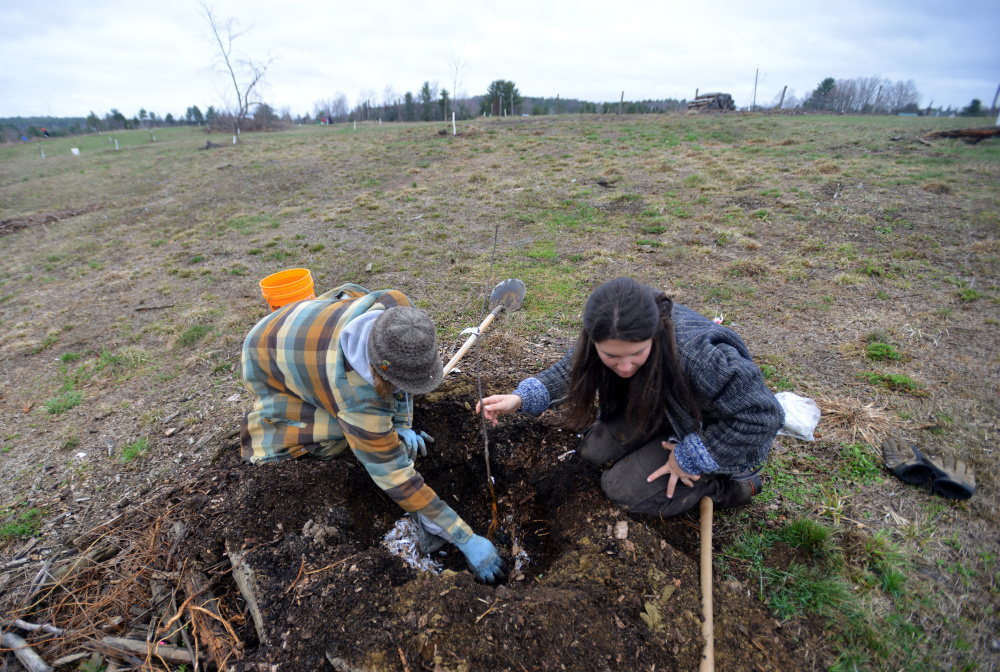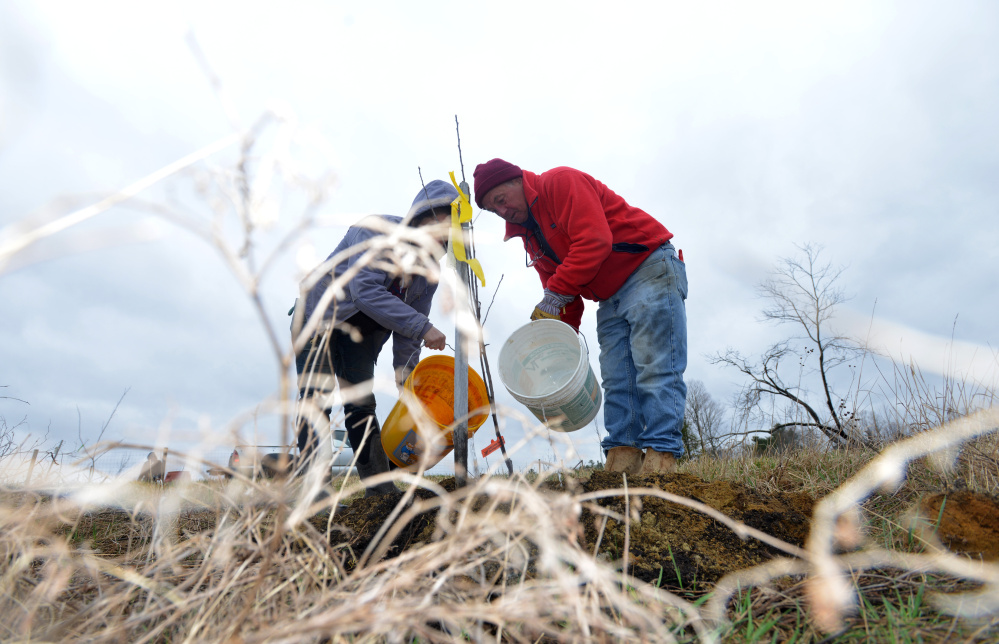UNITY — Apple trees ready for planting at the Maine Heritage Orchard lay near the entrance with tags that read names such as Black Oxford, Finley Lane and Bourassa, and while these heirloom varieties might not appear next to the McIntosh and red delicious varieties at the grocery store, some would argue they’re superior.
“These days it’s really hard to find a really, really good pie apple in the grocery store,” said John Bunker, a co-founder of the orchard that lies on Crosby Brook Road near the grounds of the Maine Organic Farmers and Gardeners Association, or MOFGA.
On Earth Day this Saturday, a few dozen people gathered at the 10 acres of terraced grounds that was formerly a muddy gravel pit. They each took a tree, each with a name that can’t be found in most stores, and planted it along the rows. This is the fourth spring planting for the orchard.
For John Correa of Trenton, the day of planting was also sentimental. He placed a memorial tree for his brother-in-law, who died three years ago, along a part of the terrace overlooking a stream.
The tree is a Northern Greening variety, which originated in Orland near Correa’s residence.
“I’m interested in the history of Maine apples and how important they were to the settlement,” he said, adding that the variety he chose is unique because it was reportedly something Americans sent back to England.
The trees were planted in marked spots that had a small compost pile on top. First, Bunker said during a demonstration, you weed the dirt pile, then you dig a hole for the tree. The hole should be “more like a salad bowl than a post hole,” he said. When Bunker had dug the hole deep enough, he made a small hill in the center and lay the roots of the tree over it, then put the soil on top. He also made a berm, a narrow ridge along the outside of the hole that would keep the rainwater from going toward the tree.
There were 25 apple trees to plant and 100 other fruit trees, such as elderberry. The orchard has 300 apple trees planted so far.
Fred Kraeuter of Boothbay attended the first year of planting in 2014 and came back again this year.
“I just like to be a part of something as important and historic as helping to preserve the heirloom apples of Maine,” he said.
Jenny Koontz and Jordan McHugh, both apprentices at the farm Bunker runs with his wife, Cammy Watts, in Palermo, said they came to the area because they were interested in learning about farming in Maine.
“I’m really interested in Maine and how progressive they are in organic farming,” Koontz said. Before coming to Maine, she worked at an orchard for four years after college before moving to Alaska.
McHugh heard about MOFGA and then found the apprenticeship, which she thought would be a good opportunity to learn about apples before possibly working in the cider business one day.
“(Bunker’s) kind of just like the ultimate apple guy,” she said.
As more people look to cook or make cider with apples, they’re going to look for varieties that create a better product, Bunker said in an interview Thursday.
“They don’t exist in the grocery store anymore, but they do still exist,” he said.
Heritage or heirloom varieties of apples and other fruits exist in the “old, broken-down farm orchards of Maine” that Bunker searches out to get scions to graft onto seedlings. For example, he found an old apple tree in Belgrade that is a variety called Judy, so he took a few scions and grafted it onto a small seedling at the Maine Heritage Orchard.
In Maine alone, about 500 to 1,000 apple varieties were grown, but most disappeared by 1900.
“We left the world of diversity for the sake of convenience,” Bunker said.
In the past, he said, the apple orchard “played a small but important role on every farm.”
Each farm had small orchards of 10 trees, or maybe a few more, and mainly used the apples themselves or in the surrounding community. Because they were localized and adapted to the specific soil conditions of a region, the varieties grown in Waldo County would be different from those grown as nearby as Waterville.
“As we left that world of the small, diversified farm and entered the world of the large commercial farm,” we lost many of the varieties for practicality’s sake, Bunker said. “Hannaford’s wouldn’t know what to do if they had 500 varieties in their produce section.”
The many varieties represent a piece of Maine’s history. A list of all the apple varieties kept in the Heritage Orchard shows that many originated in Maine, some from long ago. For example, Aroostook Sunset came from Mapleton before 1870 and Black Oxford came from Paris in 1790.
“These varieties represent a huge diversity. They come in all sizes and shapes and colors and seasons,” Bunker said, adding, “When I was young, I realized there was a huge resource that we shouldn’t let go.”
He started to collect scions and graft them onto seedlings at his farm, the Super Chilly Farm, in Palermo, but he eventually ran out of room. Then he worked with the late Russell Libby, who led MOFGA up until 2012, to establish the Maine Heritage Orchard.
The work is important, Bunker said, because it will preserve the apples for future generations as well as part of our heritage.
Some of the varieties are adaptive and disease resistant, he said, making them a practical choice for home gardens.
“Plus it’s this incredible body of genetic material that was developed by Mainers,” he said. “I felt like it would be a terrible shame to lose this.”
The orchard serves as an educational facility where innovative techniques are tried to shape what was a gravel pit overlooking a muddy stream into a semi-circle of terraced land blooming with fruits, and it hosts a spring planting every year that provides people with a way to make a difference locally.
“The beauty of something like Earth Day is not thinking good thoughts about the earth, but it’s actually going out and doing something,” Bunker said.
“What can be more in line with … Earth Day than planting a tree?”
Madeline St. Amour can be contacted at 861-9239 or at:
mstamour@centralmaine.com
Twitter: madelinestamour
Send questions/comments to the editors.




